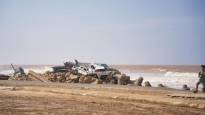People were not warned about the threat of flooding and were not evacuated. According to the Finnish director of the World Meteorological Institute, WMO, there are also problems in other warring countries.
Most of the victims of the recent floods in Libya could have been avoided if the warning and rescue service systems had worked properly, says the director of the UN’s World Meteorological Organization, WMO Petteri Taalas.
In that case, people could have been evacuated from the eastern parts of Libya, which were devastated by the flood.
Internal conflicts that have continued for years have led to the fact that Libya does not have a functioning weather service that could send warnings, Taalas stated at the press conference.
Taalas said that the WMO has previously been in contact with the Libyan authorities to help them reform their meteorological system. However, efforts have been hampered by security threats.
Libya has been without a functioning central government since the country’s leader Muammar Gaddafi was ousted by a military alliance in a NATO-backed uprising in 2011. There is an internationally recognized government in the capital, Tripoli, but a different government rules the eastern part of the country.
Huge destruction in Derna
At least 5,000 people were killed in the flood of attacks that hit eastern Libya over the weekend. At least 10,000 more are missing.
In part of the east coast, it rained more than 400 millimeters in one day. The exceptionally heavy rains broke two dams, and water rushed into the city of Derna. Even seven-meter waves swept through the city. Tens of thousands of people lost their homes.
Many people have reported that the flood caught them by surprise and they were sleeping when it started.
The Libyan Meteorological Institute notified the authorities of the threat by email three days in advance and urged them to take precautions. However, according to Taalas, it is unclear whether the message was spread effectively. The WMO regional office says that the problem was not in issuing the warning, but in the inability of the Libyan authorities to handle such an exceptional situation.
Taalas points out that similar problems in giving advance warnings also exist in other conflict-torn countries such as Sudan. The Sudan Meteorological Department has told him that most of its personnel have fled the fighting in the capital, Khartoum.
In Ukraine, on the other hand, a third of the weather stations have been destroyed and the system can no longer be operated continuously. They estimate that they get about a fifth of the data they got before the war, Taalas says.
Sources: AFP, Reuters
